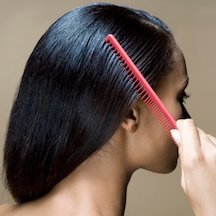 A new study by researchers at Boston University finds a possible link between the heavy use of lye-based hair straightening products, or relaxers to a greater risk of breast cancer for African American women.
A new study by researchers at Boston University finds a possible link between the heavy use of lye-based hair straightening products, or relaxers to a greater risk of breast cancer for African American women.
Researchers used data from Boston University’s Black Women’s Health Study which has documnted the health of 59,000 African American women for over 25 years. They found that 5 percent of the African Americans women participants in the study never used hair relaxers, 5 percent were light users, 70 percent were moderate users, and 20 percent were heavy users. Heavy users were Black women who used hair products containing lye at least seven times a year for 15 or more years.
Comparing user data to incidence of breast cancer, the researchers found that Black women who were heavy users of hair relaxers had an approximately 30 percent increased risk of estrogen receptor positive breast cancer compared to other Black women.
The authors conclude that “given the high prevalence of use of these products among Black women, further research is warranted to better establish associations according to breast cancer subtype as well as according to specific products.”
The study, “Hair Product Use and Breast Cancer Incidence in the Black Women’s Health Study,” was published on the website of the journal Carcinogenesis. It may be accessed here.












If these findings are statistically valid, then I should expect to see these “leading White researchers” (Patricia F Coogan and Lynn Rosenberg) contacting the US House of Representatives and Senate to put forth a bill which BAN the usage of such products. Anything less is nothing more than an research exercise in futility. What make matters even more troubling is that we have people who racially or ethnically belong to the native born Black American community serving in the capacity as the “expert”. For those who dissent, there are numerous native Black American scholars who have posited this specific issue for decades without any sort of fanfare.
I certainly hope these research send their findings to the National Medical Association (NMA), the National Association of Black Journalists (NABJ), the National Black Nurses Association (NBNA), and the National Black Network (NBN) in order to adequately inform so-called Black American women to stop using those carcinogenic products. I can only imagine how angry those so-called Black women in those so-called Black Greek sororities adhered to these findings. Let the games begin.
While I am not a fan of relaxed hair, the actual study states: “Results of this study were largely null, but there was some evidence that heavy use of lye-containing hair relaxers may be associated with increased risk of ER+ breast cancer. Consistent results from several studies are needed before it can be concluded that use of certain hair relaxers impacts breast cancer development.”